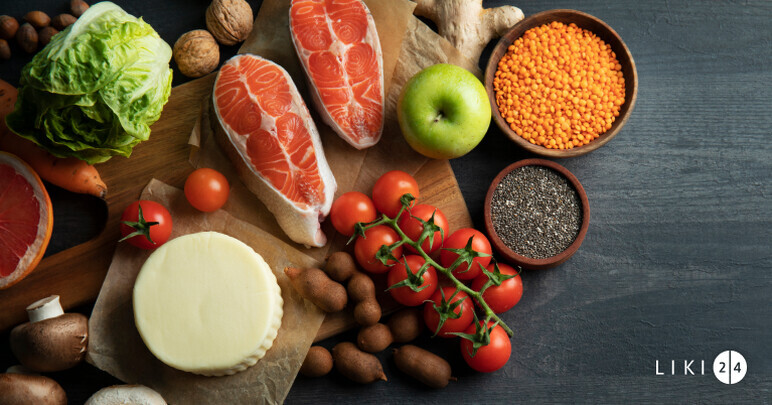A bit about protein
Proteins can be of animal or plant origin and are made up of amino acids, which in turn are divided into essential and non-essential. The essential amino acids (leucine, isoleucine, lysine, methionine, etc.) cannot be synthesized in the human body and must necessarily be supplied by food.
The amino acid content determines the value of protein, and the type of protein influences its digestibility and absorption in the gastrointestinal tract.
The important role of protein has been recognized since the 18th century. At that time, the French chemist Antoine François de Fourcroy hypothesized that substances that coagulate on heating (e.g. egg white) are involved in many processes in the body.
The term "protein" was first proposed in 1838 by the Dutch chemist Gerardus Johannes Mulder. It derives from the Greek word "proteios", meaning "important" or "primary". Scientists assumed that proteins are the main building material for tissues.
Today, the possibilities for studying the structure and function of proteins have expanded considerably: thanks to modern methods, scientists can model their structures and predict their behavior.
Why are proteins needed?
Proteins are a source of energy. Burning 1 g of protein provides 4 kcal energy. For carbohydrates this is the same, but for fat it is much higher - 9 kcal. Proteins therefore have another main function: they are the building materials from which tissues, organs and, above all, muscles are formed.
Because of the value of proteins, the body uses them as a last source of energy: first carbohydrates are consumed, then fats and finally, when nothing else is left, proteins.
This principle underlies all high-protein diets: when the body is deprived of external carbohydrate and fat intake, it starts to burn its own reserves - for example, fat deposits on the abdomen and hips.
Protein is indispensable in sport because it is from protein that muscle tissue is formed. If an athlete doesn't eat protein, not only can he or she forget not only about winning, but also about taking part in competitions themselves.
Without protein, bodybuilding is also impossible. And developing muscle mass and achieving a defined body shape remain just a dream if the diet lacks protein.
Interesting facts! Our body also owes its flexibility to protein - elastin. If elastin were not produced in the body, our tissues would be so stiff that we couldn't even smile. The brain uses proteins to make neurotransmitters, which transmit signals between cells. Without them, our thoughts and feelings would remain "untranslated"
What foods are proteins found in?
Proteins are found in most foods, but their composition and digestibility can vary considerably, which is why proteins are divided into two broad groups:
- Complete proteins;
- incomplete proteins.
Complete proteins contain essential amino acids and are well absorbed in the digestive tract. They include almost all animal proteins (meat and poultry, fish and seafood, eggs, milk and dairy products). Incomplete proteins are much less absorbed in the gut and are not rich in amino acids. These are plant proteins.
Vegans seem to be at a disadvantage, but there is one plant-based exception - soy. Because of its composition, it is very similar to meat and is an excellent meat substitute.
Foods with the highest protein content:
- beef and veal;
- turkey (breast);
- pork;
- fish (halibut, tuna, salmon);
- egg whites;
- low-fat Parmesan cheese;
- soy.
Note: Nuts are also high in protein. For example, the protein content in 100g of walnuts can be up to 33g, which is more than in 100g of turkey. However, the digestibility of plant proteins is less than half, while animal proteins can reach almost 100% (e.g. egg white).
Although salmon and tuna, as well as turkey breast, are delicious and healthy products, they are not accessible to many people. That's why a common internet search is "cheap protein-rich foods". But to feed yourself properly, you don't have to spend a lot of money. Just focus on the following products:
- chicken breast;
- legumes (e.g. beans, soybeans, mung beans, lentils);
- eggs and dairy products;
- common nuts;
- low-fat and cheap cheese;
- Tofu (contrary to popular belief, it's cheap - the important thing is to know where and what to look for);
- cheap fish (e.g. mackerel).
Important! All foods containing meat, fish, eggs and milk are high in protein, which is well absorbed. This does not mean, however, that you should give up plant foods. On the contrary, they should predominate in your diet: it's much healthier to eat more beans or soya than pork.
Protein-rich cereals include buckwheat and oats, fruit - avocado and banana, and vegetables - garlic.
Adults leading a normal lifestyle need about 60g of protein a day, or 0.8g/kg body weight. But there are different rules for athletes and bodybuilders.
How much protein is needed for muscle development?
Muscle mass is important primarily for athletes, but many men (and women!) want to flaunt a well-defined body. It is considered that 1.2-2.2 g of protein per kilogram of body weight should be consumed for moderate intensity training. For lean amateur bodybuilders, the protein norm for muscle development is 1.6 g/kg, while trained athletes with a low body fat percentage need 2.3-3.1 g/kg.
In the case of pre-competition bodybuilders, their protein intake norms considerably exceed the recommended values.
In lighter training, the norm for an average active person may be sufficient - 0.8 g/kg.
Do not confuse the amount of pure protein for muscle building with the food that contains it. For example, 100 g of chicken contains only 18.2 g of protein.
What and how to eat for muscle building
Although it is simple to calculate the amount of protein you need per day, selecting a balanced diet can be difficult. It is very important that essential amino acids are consumed at every meal - this means either animal products or a careful combination of plant products (as we recall, their amino acid content is far from ideal).
The second problem is that no food is 100% protein. It generally also contains fats and carbohydrates. By consuming animal protein in the form of chicken or pork thighs, cottage cheese, eggs, it is very easy to exceed your daily fat intake.
Main dietary rules:
- Eat skinless chicken breast instead of thighs;
- cut the fat off meat;
- eat low-fat dairy products (cottage cheese, yogurt, milk). And remember that they contain carbohydrates - lactose;
- Replace whole eggs - chicken or quail eggs - with egg whites (yolks contain a lot of fat, cholesterol), it is allowed to eat 1 yolk for every 3-4 egg whites;
- avoid cream, whipped cream and butter because of their high fat content.
Important! Although fats should be limited, you should not give them up completely. They are necessary for the synthesis of sex hormones, the normal functioning of the gut, nervous system and brain, as well as for the prevention of atherosclerosis. And fats remain a valuable source of energy.
It is not ordinary animal fats that are useful for the body, but polyunsaturated fatty acids ( PUFAs ), which are found in fish, seeds, nuts and vegetable oils. Fish can almost be considered an ideal muscle-building food - it contains easily digestible protein and useful PUFAs.
Warning: legumes (beans, lentils) are not only rich in plant protein, but also in sodium. Sodium retains water and can worsen muscle density, so these products should not be consumed in excess.
The ratio of protein, fat and carbohydrate in muscle building should be 2:1:4 on average.
Why are protein supplements necessary?
Food supplements containing protein can be used both to satisfy hunger and for muscle building. In the latter case, it is very important to consume protein foods with care, as it is very easy to harm the body.
Protein bars
Protein bars are a healthy and tasty snack enriched with protein. As well as protein, they contain fat and carbohydrates. Of course, these bars are of little help to athletes and bodybuilders, but for the average active person they are very suitable. They satisfy hunger well and help you recover quickly after moderate exercise.
They may contain casein, soy protein isolate, whey protein concentrate, as well as vegetable protein - for example, protein from rice, nuts or other sources.
Protein
Protein is essential if you really want to increase your stamina and muscle mass. They help to synthesize contractile proteins, increase the production of insulin and somatotropin in the blood (which promotes muscle growth!), suppress the secretion of cortisol and catecholamines, which break down muscle tissue.
In addition, protein supplements are a source of energy. If the body is not supplied with protein after an intense workout, a severe catabolic state can occur and all forces will be directed towards repairing the damage.
The following proteins are used for muscle development:
- whey protein (fast) - is rich in leucine and is practically immediately absorbed, considered the best anabolic;
- Casein - is used as a supportive protein supplement and is consumed before bedtime;
- egg protein - as effective as whey protein but more expensive;
- meat protein - the most expensive protein, which does not surpass egg and whey protein in effect;
- soy protein - its effectiveness is questionable.
However, even the best protein cannot replace a balanced diet of protein, fat and carbohydrate. Dietary supplements should only be consumed as a supplement to the diet and preferably in consultation with a doctor.
The Liki24 team wishes you good health, stamina and well-defined muscles!


 Wellness
Wellness  Fitness
Fitness  Nutriție
Nutriție  Frumusețe
Frumusețe  Fitness
Fitness  Nutriție
Nutriție  955 Views
955 Views 







